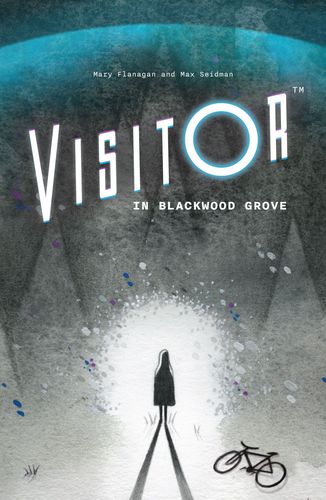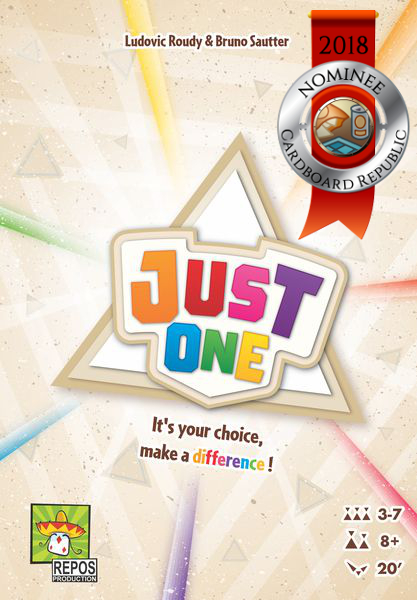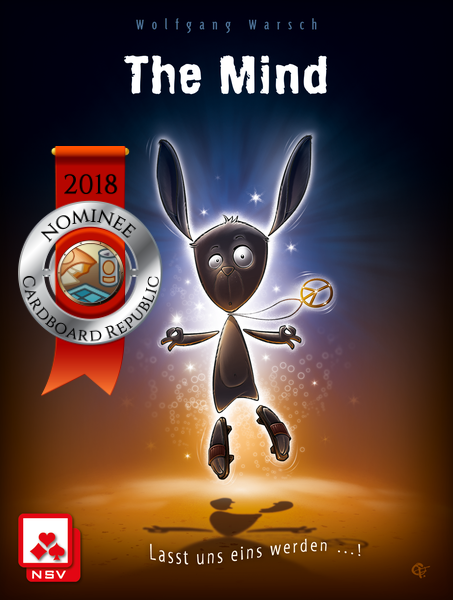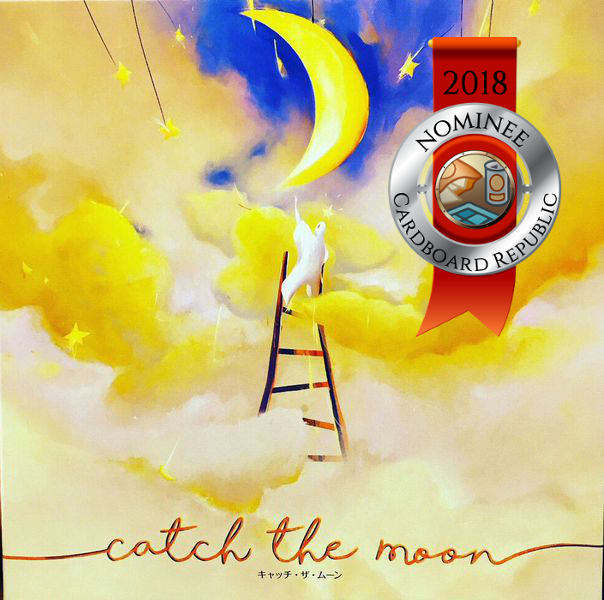The Cardboard Republic has rolled out the annual Laurels of the Republic awards, celebrating the best new games released in 2018 for each of the gamer archetypes. What follows are the finalists for one of those groups.
 There are few things that Socializers want more out of games than a means to engage with other players as much as possible. If they were a clan, their credo would be ‘Light on Rules, Heavy on Interaction’. Games to this group are less about picking out intricate strategies or figuring out a way to win at any cost than they are about a means to collectively enjoy spending time with other people. As a result, this group prefers games that either have short and simple playthroughs or those that permit them the opportunity to, well, socialize with other players.
There are few things that Socializers want more out of games than a means to engage with other players as much as possible. If they were a clan, their credo would be ‘Light on Rules, Heavy on Interaction’. Games to this group are less about picking out intricate strategies or figuring out a way to win at any cost than they are about a means to collectively enjoy spending time with other people. As a result, this group prefers games that either have short and simple playthroughs or those that permit them the opportunity to, well, socialize with other players.
And with that, here are The 2018 Laurel Finalists for Socializers:
Honorable Mention: Visitor in Blackwood Grove
Publisher: Resonym | Players: 3-6 | Play Time: 10-25 Minutes

Some games strive to create uniquely identifiable themes, whereas others choose to lean heavily into licensed identities. Visitor in Blackwood Grove is largely the former, but it’s also hard to escape some of its clear inspirations. Because, essentially, Visitor of Blackwood Grove is Mysterium meets E.T.
In each playthrough of this card-based deduction game, one player is the Visitor, an alien who has crashed landed on Earth and who weirdly doesn’t speak our language. The only thing holding the outside world at bay – specifically, a series of government agencies that really want to get in there for Reasons – is a strange, semi-permeable forcefield that allows certain items through but not others. At the onset of each game, the Visitor player secretly comes up with this Pass Rule based on a handful of revealed picture cards.
Aiding the alien is The Kid, another player who seeks to help the Visitor get their ship repaired and off our third rock from the sun. As additional picture cards are systematically added to the table each round, the goal of the Visitor is to get The Kid to correctly guess the Pass Rule, and if successful, both players win as a team. If any of the players acting as government spooks guess the Rule first, however, then they alone win, and it’s curtains to our favorite ALF-like creature.
Visitor gets the Honorable spot here thanks to its mix of slightly asymmetric player powers, a shrewd implementation of public and hidden information, and a high degree of replayability between the variety of card pictures and the open-ended nature for the Visitor to pick a Rule that’ll be easy enough for one player to guess but difficult for the rest. It’s a creative and original 20 minute deduction game that’s approachable, entertaining, engaging, and taps ever so slightly into some 80s nostalgia. For Socializers, that combination is just a little out of this world.
The Nominees

Number Five: Just One
Publisher: Repos Production / Asmodee North America | Players: 3-7 | Play Time: 20-30 Minutes
 Chances are if you’ve ever sat down to play a party game, they most likely fall into two one of two categories: those with a ‘Judge’, a card up for grabs, and each person trying to rack up the biggest pile by the time the game ends; or those that break you up into competing teams. So it’s refreshing when a game comes along that feels like it belongs to one of those camps but attempts something new.
Chances are if you’ve ever sat down to play a party game, they most likely fall into two one of two categories: those with a ‘Judge’, a card up for grabs, and each person trying to rack up the biggest pile by the time the game ends; or those that break you up into competing teams. So it’s refreshing when a game comes along that feels like it belongs to one of those camps but attempts something new.
Just One is that kind of enigma. Because while in many ways it acts like a classic party game, it differs just enough to foster a pleasantly distinct experience.
For starters, the entire table in Just One works cooperatively to win as many cards from a randomized card stack as possible, but accomplishing this is often easier said than done. On each player’s turn, they place the top card of the deck in front of them Hanabi-style, such that everyone on the team but them can see it. They then choose a random number, corresponding to one of the words on the card. The rest of the team must then write down a one word clue that will be simultaneously revealed and shared in the hope that the combined hints will be enough for that player to guess the word. If correct, the team keeps the card. The more cards you complete out of the deck, the better your (albeit arbitrary) score at the end.
The twist to Just One though, and why it avoids mere run-of-the-mill party game status, is that if anyone uses the same word, it’s removed instead, making guessing that much harder. This creates a lightweight but energetic tension as everyone tries to come up with something simple enough to work as a clue but specific enough that no one else will use it. With simple rules and a focus more on the experience of the reveal and discussing one another’s thought processes than on the game’s outcome, this familiar yet inventive twist on the tried-and-true party game scene will have plenty of Socializers asking for just one more go-around.
Number Four: The Mind
Publisher: Pandasaurus Games | Players: 2-4 | Play Time: 15 Minutes
 Is it a game? Is it an activity? Does it even matter? Of all the games released in 2018, few were as frequently discussed or as polarizing as The Mind, a surrealist take on the much lauded but poorly named The Game. For a tiny game of just over 100 cards, you either loved what The Mind brought to the table in terms of its psychological undercurrents and underlying emphasis on kinesics, or you found it to be an overhyped exercise in trying to accomplish a simple task with an arbitrary handicap.
Is it a game? Is it an activity? Does it even matter? Of all the games released in 2018, few were as frequently discussed or as polarizing as The Mind, a surrealist take on the much lauded but poorly named The Game. For a tiny game of just over 100 cards, you either loved what The Mind brought to the table in terms of its psychological undercurrents and underlying emphasis on kinesics, or you found it to be an overhyped exercise in trying to accomplish a simple task with an arbitrary handicap.
The Mind is a cooperative game played out over a series of rounds, depending on the player size. Each round, players draw cards equal to the current round number. During each round the team must work to correctly play the entirety of their cards, which range in value from 1-100, to the board in ascending order. As hand sizes increase, the difficulty of the game escalates quickly. Incorrect card throws will cost your team a life; lose too many of those and your efforts end in failure.
That’s it.
In and of itself, this would make the game rather mundane and unremarkable. The twist with The Mind, however, is that players cannot speak or overtly communicate with one another. At all. Instead, through some effort, a little trial and error, and a healthy dose of processing of nonverbal behavior, the majesty of the game unfolds as players find themselves coordinating with one another in a concentrated – albeit silent – manner. Few games can boast being interactive and encapsulating while also preventing its players from speaking, but The Mind successfully found a way. And it does so remarkably well, which is down right impressive.
While a game residing at the intersection of silent collaboration and the human subconscious outwardly seems to run counter to a game for Socializers, The Mind’s succinct gameplay coupled with a genuinely unique shared gameplay experience is precisely the sort of game that will draw this group in and keep them enthralled across multiple playthroughs.
Even if they can’t always quite vocalize why.
Number Three: Welcome To…
Publisher: Deep Water Games / Blue Cocker Games | Players: 1-Any | Play Time: 25-30 Minutes
Welcome To…a fairly obvious game nomination.
With roll-and-write games exploding in popularity over the last couple years, odds were high that at least one would make the finalists list, and Welcome To rightfully earned its spot, with another two coming within striking distance. This particular title was an immediate hit with the gaming community and had many people ironically wondering about stateside availability until the nascent Deep Water Games announced early in 2018 it would be having that honor. And it hasn’t looked back since.
Modifying the core concept slightly by replacing dice elements with a deck of cards, Welcome To invites you to come and partake in a jim-dandy game about residential planning in 1950s suburban America.
Except, you know, fun.
In this game, each player is given a blank sheet depicting a quintessential suburban development, complete with an array of features waiting to be installed. Turns are taken simultaneously by flipping over three decks of cards, each with a randomized combination of house number and feature. Each turn you must decide which of the three decks to select in order to add houses, parks, swimming pools, and fences to one of the building lots in your three housing rows – all while contending with the fact that house numbers in each row must always be in ascending order. The race continues as everyone tries to maximize their town’s value by way of careful building and public objectives, with the highest valued suburb crowned the ultimate Pleasantville.
Yet what makes Welcome To particularly appealing to this group isn’t solely the game itself; it’s also very much about the ambiance it creates. With its laid-back pacing and straightforward premise, any number of people can play together while still focusing on your individual pursuits. Thanks to its simultaneous nature and incremental decision-making moments, Welcome To enables player engagement through those brief moments surrounding the gameplay. It gives you the ability to hold conversation on matters beyond the game while still being very much invested in its outcome. To Socializers, there is no better purpose for a game than interacting with others over shared interests, and Welcome To provides a marvelous blueprint to accomplish precisely that from all sides.
Number Two: Catch The Moon
Publisher: Bombyx / Asmodee North America | Players: 2-6 | Play Time: 15-20 Minutes
It’s not every day you get to talk high praise about a game where the purpose is to avoid making the moon cry, and yet here we are.
No, really, that’s what Catch the Moon is ultimately all about.
Originally a 2017 release in Europe, Catch the Moon only ended up making the leap over to North American markets in mid-2018, and even then it landed quietly. It was only after being showed off at Gen Con that it started to quickly climb on people’s radar thanks to its esoteric theme, super simple ruleset, and incredible table aesthetic.
In this wonderfully wistful dexterity-based stacking game, players are dreamers attempting to build a ladder to the moon (like you do). Each turn consists of rolling a die and adding a wooden ladder piece to the existing structure, with the die stating what placement requirements you have to adhere to, often including placing your piece such that it’s the highest one in the pile. So long as pieces don’t fall off the table in the process, any manner of precarious overhangs, interlocks, or daring angle placements aren’t just expected – they’re encouraged. Should any pieces fall, however, the moon is saddened by your failure and you must take a tear instead. When the game ends, the player with the fewest moon-tears is the winner.
Catch the Moon isn’t a deeply complex game, but it’s impossible to overlook its inherent value due to the degree to which it nurtures social interaction, table discussion, and a rising communal excitement when it crescendos towards completion as ladders become increasingly challenging to place and the tension mounts to match. All in about 20 minutes.
Indeed, Catch the Moon is a wonderful example of a game whose emphasis is very much on being in the moment with the other players and whose degree of enjoyment far exceeds its modest outward appearance. It’s concise, creative, memorable, and overwhelmingly inviting in a way that, to Socializers, is a dream unto itself.
So much so, in fact that it was the early front-runner for this year’s Laurel, and may have ended up with it if not for another title that successfully cracked the top spot on the list…
The Winner
2018 Socializer Laurel – Decrypto
Publisher: IELLO Games | Players: 3-8 | Play Time: 15-45 Minutes
What do Dampness, an Ark, Tacos, and Andy Samberg have in common? If you think you have an idea, then enter the paper-filled world of intelligence gathering with Decrypto.
Unlike most of the other titles on this list, Decrypto didn’t jump onto the scene so much as quietly made a name for itself in the background over the course of the year, slowly gathering up praise and acclaim as a vibrant and creative team-based social word game that thrives both on teamwork and misdirection.
Which is pretty fitting, honestly.
In Decrypto, players are split into two teams, each with their own slotted decoder board. At the onset of each game, these four numbered slots are randomly filled with words or phrases that only their team sees. Each round, one person from each team acts as their Encoder and is tasked with drawing a 3-digit code card. Their job, should they choose to accept it, is to write down three clues to get their team to guess the correct numerical sequence by matching the clues to their team’s keywords.
Clues in Decrypto can practically be anything, leaving you incredible latitude to be as imaginative, clever, or ridiculous as you want. But because it wouldn’t be a proper spy game without espionage, Encoders must be careful as the other team is listening. They too are trying to determine your code by piecing clues together over several rounds. To ensure the opposing g-men don’t decipher things too quickly, suggestions need to be obvious to your team but not so obvious to the others. Victory is assured by guessing two of your opponent’s code cards, whereas your own team failing twice will make all your intel-based skullduggery for naught.
Decrypto is engaging, dynamic, and insanely replayable. It’s a little more procedural than your typical party game but makes up for it by being highly flavorful, encouraging collaboration, affording loads of clue-giving freedom, and allowing you to be as serious or irreverent as you prefer – if you think it’ll give you an advantage. All in about a half hour. As a result, though Decrypto may be all about deciphering clues, in this case there’s no secret as to why it has earned this archetype’s top spot for 2018.
![]()
Decrypto Contest!
We thought about different ways to celebrate the winner of this year’s Socializer Laurel, including trying to stage a massive localized rendition of Spy Vs Spy or organizing an online contest to see who could crack a seemingly indecipherable code. For a variety of legal and liability reasons, neither turned out to be the best move. The former turned out to be a terrible idea due to something involving insurance premiums, and the latter apparently ran us dangerously close to encouraging computer hacking, espionage, or some combination thereof – as well apparently already being eerily close to the plot of The Last Starfighter. Plus, in both cases we were worried our pool of participants would be incredibly limited, which sort of runs counter to the entire spirit of this category. In the end we opted for the most direct approach: providing one lucky winner with the opportunity to enjoy the award-winning game first hand. So that is what we’re going to to do right…now.
That’s right! Enter below for your chance at your very own copy of Decrypto!
Note: In honor of their award recognition, IELLO Games has kindly provided a copy of this game for giveaway purposes.
![]()
Be sure to check out the 2018 Laurel Award pages for the other archetypes once they go live!










